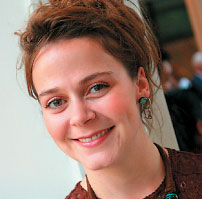Alison M. Friedman (pictured) planned to be in China only for the two months of a summer language program in 2000. But she fell in love with this "wild, gritty city" and its culture of modern dance. She is now the international manager of Beijing Modern Dance Company, China's premier modern dance company.
Two weeks after first arriving in China, Friedman decided she would extend her stay to six months. She would not return to the US for her fall semester at Brown University, where she studied Chinese Literature/Literary translation.

"I called my parents and I called my university and I told them I wasn't coming back in the fall. My Chinese teachers were of course thrilled that I wanted to stay longer, while my parents were nervous that I had only packed enough clothes for a hot Beijing summer but suddenly I was staying through the winter!"
Not only that, but she was moving to Harbin, Heilongjiang Province, one of the coldest cities in China. She bought winter clothes at small markets around the city, and a giant army coat once she arrived in Harbin.
Friedman returned to the States but in 2001 was back in China, this time as an intern for the Beijing bureau of the American news station CNN. While here, she met choreographers of the Living Dance Studio, Wen Hui and Wu Wenguang.
"I performed with them in a production called Dance with Farm Workers because 30 Sichuan migrant workers also performed with us 10 dancers. It was not only cross-cultural between American and Chinese dancers, but also between dance artists and construction workers - people from two very different cultures of society. Over 300 people came to see the performance that night in 2001, in an old textile mill," she said.
Friedman was so inspired by working with the Living Dance Studio, she applied for a Fulbright Fellowship on graduating, and came again to China to research the development of the country's modern dance. "For the first time, I felt like I had found a 'family' here. We shared the same culture of modern dance. I wanted to learn more about modern dance in China."
She enrolled at the Beijing Dance Academy and studied modern, ballet, folk and classical Chinese dance, also traveling throughout China to interview choreographers, dancers, educators, and other modern dance pioneers. "It was the perfect vantage point from which to understand this country: how its education, economy, policies are changing, and how that affects the development of this art form."
Her program ended more than a year ago, and she has since pursued a career as a freelance dancer and choreographer.
"I think subconsciously I knew I would end up here, but no, I never planned it. When I came to Beijing in 2002, I thought I would be here for one, at most two years. Now it's been five years and I don't plan to go home any time soon! My mother still jokes with me: 'When is that 10-month fellowship over again?'" she said.
Recalling her first days in the capital, Friedman said she felt like Alice in Wonderland: lost, amazed, confused, curious. "Everything I thought I knew was turned on its head, distorted and questioned, like I was on the other side of the looking glass," she said.
"I had to make sure to laugh: at myself, at my mistakes, and at the confusion I experienced. As Alice fell down the rabbit hole, she found the fall frightening but also intriguing. I could only remind myself to be patient and enjoy the ride."
Friedman's handle on the Chinese language helped her greatly in building a stellar career in "Wonderland". To this end, she made an effort to work in all- or mostly-Chinese language environments. "My Fulbright research was all in Chinese, my job at CRI was mostly with Chinese colleagues, and at the Beijing Modern Dance Company we only ever use Chinese. So most of my day is immersed in this language."
From 2003-2005 she worked as a DJ at China Radio International. Often taxi drivers recognized her voice from listening to her show. "I loved meeting my listeners in person and hearing how much they enjoyed the show and the music I played or other information I discussed," she said. She returned to the US to work at the Kennedy Center in Washington DC in 2005 for its Festival of China, the largest festival of Chinese performing arts in US history. Returning to Beijing in December 2005, she began her job at BMDC.
(China Daily 10/10/2007 page18)